![]()
Wed, Dec 12, 2012 | RubinReports | By Barry Rubin
Former title, “Syria: Obama Initiative Marks the Start of the End”.
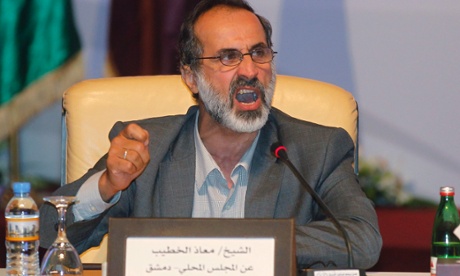
Mouaz al-Khatib, leader of the Syrian National Coalition for Opposition and Revolutionary Forces, is a former imam of the Umayyad Mosque in Damascus. He has a reputation for anti-Western and anti-Semitic writings.
For all practical purposes, President Barack Obama has now recognized the Syrian opposition group as the government of Syria. Specifically, he called them the “legitimate representative” of the Syrian people.” The European Union did the same a few days earlier. While this move has little immediate, practical effect, it is enormously interesting for understanding this issue. And it is also yet another signal that the civil war in Syria is moving into the end-game.
First, the implications include the following:
— Thank goodness that only happened after the U.S. government switched its allegiance from the Syrian National Council (SNC). That group, basically created by U.S. initiative (implemented by the Islamist Turkish government) was about 100 percent controlled by the Muslim Brotherhood. The new group which Obama recognized, the Syrian Opposition Council, is “only” about 40 percent controlled by the Brotherhood. That means there is at least hope of a non-Islamist regime in Syria (see below). [See note at end of article for an example of how U.S. policy gave behind-the-scenes support to the Syrian Muslim Brotherhood.]
— Let’s take a moment to remember that despite all the talk about the problems of backing dictatorships, the Obama Administration did back the Bashar al-Assad dictatorship in Syria. It then easily changed sides to back the opposition. In Egypt, too, Obama switched sides to support the opposition.
There are two lessons here. First, you can support a dictatorship and then back the opposition if a big challenge happens to take place. Second, what’s most important for U.S. interests is not whether the Americans want to befriend an opposition but whether the opposition once in power wants to befriend the Americans. If they are Islamists, abandon hope of that happening.
— Ironically, of course, the group recognized as being the true representatives of the Syrian people was largely created due to U.S. and Western patronage and power. While the new Council did arise from discussions among Syrians, of course, this decision shows that as in the nineteenth century the West — Obama Progressives as much as Victorian era imperialist — still tries to control who gets into power in Third World countries. Power politics is still the name of the game; the question is whether that game is well-played.
In the American presidential campaign, Mitt Romney made the little-noted assertion that the United States should put the emphasis on ensuring that moderates win in Syria. That notion is totally alien to the Obama Administration.
— The Syrian Opposition Council does not really represent Syrians, not only because those within the country haven’t voted but also because this is an external organization with little or no influence inside the country. It also doesn’t have the guns. What it will have is control over Western economic aid in future but this Council cannot be expected to be the basis for a post-civil war government.
— In sharp contrast to Libya, we know a lot about the Syrian opposition groups and their leading personalities. The problem, however, is to determine the relative military strength of each group. No doubt, the CIA has a project to analyze the situation in every province and city. I wish we could see their data but since we can’t we have to try to figure out the balance of forces.
This situation is made even more complex because so many groups exist and ideology is cut across by the existence of five different ethnic-religious sectors: Sunni Arab Muslims (about 60 percent), Christians and Alawites (about 12-14 percent each); Kurds and Druze.
Will Alawites end up being cut out entirely because that group formed the basis for the Assad regime? Probably.
Will Christians end up being cut out almost entirely because that group backed the Assad regime due to fear of the Islamists who now will probably try to cut them out? Probably.
Will there be massacres of Alawites and Christians by a victorious opposition, accompanied by tens or even hundreds of thousands of cross-border refugees? Very possibly, yes.
Will the Kurds gain autonomy for their home region in the northeast, an autonomy they are ready to defend using armed militias? Very possibly yes. (Incidentally, it is fascinating to consider how the Kurds in both Iraq and Syria have succeeded on the ground with the opposite strategy from that of the Palestinians. The Kurds have focused on practical measures and on getting a really functioning Kurdish entity; the Palestinians have put the priority on symbolism and total victory.)
The ultimate complication in Syria is the existence of six distinctive ideological camps:
— Salafist groups allied with al-Qaida. There may be more than 25 such organizations and they also include fighters from a wide variety of European and Middle Eastern countries. These groups have no chance of taking power or even a large share of any future parliament.
Their threat is that they would be dangerously disruptive: attacking Alawites, Christians, and also Kurdish autonomists; trying to attack Israel from Syrian territory; fomenting anti-American and anti-Western views or even waging terrorist attacks on Western people and institutions in Syria; and attacking more secularist politicians, women who favor modern ways, etc. But, again, they are not well organized and will not gain any domestic political power.
— Salafist groups not allied with al-Qaida. Everything said about the al-Qaida linked groups also applies to them except that they might have significant foreign backing from Saudi Arabia (which wants to subvert Muslim Brotherhood power) and they could get a significant share of parliamentary seats if they are able to unite. But this sector, too, is not likely to gain state power.
— The Muslim Brotherhood. This is the only truly united group in Syria that has a significant national appeal, a clear agenda, and a disciplined hierarchy. It is backed by Qatar and Turkey, while the Western countries seem to be totally uninterested in countering the Brotherhood’s appeal and ambitions.
Whatever the relative size of their military forces, they are closer to being an army than the other relatively rag-tag, ad hoc forces. Historically, the Brotherhood has been far smaller proportionately than its fraternal group in Egypt. A Brotherhood takeover of Syria is by no means inevitable but if one had to bet it seems the single most likely scenario. A key issue is whether the Brotherhood can gain hegemony among traditionalist, pious Syrians who have never had anything to do with the Brotherhood organizationally but would approve of a lot of its platform regarding a Sharia-oriented state and rejecting a modern liberal or Arab nationalist approach.
— The moderates. There are a lot of liberal forces in Syria, especially among urban Sunni Muslim Arabs who are intellectuals or in business. They are far more sophisticated and skilled than their Egyptian counterparts (sorry, Egyptian friends, but it’s true) and they could form alliances with Kurds and Christians also. Unfortunately, the West hasn’t helped them very much. They also have some characteristic weaknesses. These include factionalism, a blindness toward the practical political work of mobilizing the masses, problems in communicating with their traditionalist fellows.
Most of all, they lack the killer instinct. They don’t have guns or militias, and they aren’t willing to intimidate or murder their rivals. That can be a fatal shortcoming in an anything-goes post-civil war Syria. Still, this group is the main alternative to Muslim Brotherhood rule. These people are not — unlike their Western counterparts — naïve about Islamists. Whatever compromises they will need to make they have no illusions that the Islamists are moderate or will become so.
— Local strongmen. This group is important even if it cannot gain power on a national level. Such people are in real control of many areas of the country; they have lots of guns; and they are able to appeal to traditionalist Syrians in rural and small town areas. They are not Islamist and don’t want Salafist or Brotherhood cadre to tell them what to do or how to live. But they will have to form alliances to have a wider effect and opportunism might drive them into the Brotherhood’s camp.
— Defected army officers. These men are the most effective military specialists. They tend to be Arab nationalists. Yet they do not form a political group and won’t do so. Their relevance comes from the likelihood that they will form the leadership of the new Syrian army which, down the road, might come to exercise some political influence or even power.
The key to Syria’s future state, then, is between two broad blocs — Islamist and non-Islamist — which will work together at least for a while to defeat the remnants of the Assad regime and create a stable new government.
The Brotherhood needs to work out something with the Salafists and to build a broad appeal with conservative-traditionalist Syrians and perhaps with local strongmen. The moderates have to learn street politics, win over local strongmen; find a way to split the conservative-traditionalist masses from the Islamists; and work out some alliance with Christians and Kurds without being branded as traitors to Sunni Arab interests.
Not only does the Brotherhood have the easier task but it also can expect more foreign support and money, even possibly from the United States. The battle isn’t yet lost but things don’t look great.
That’s especially true since a West that set up a new regime in Libya and helped (albeit fairly little) the opposition overturn the Syrian regime, suddenly freezes when it comes to helping ensure that Syria has a pro-Western government that contributes to regional stability and is less repressive at home.
Note:
— The Libyan government gave 50 percent of the funds to finance the budget of the Muslim Brotherhood-dominated Syrian National Council (SNC) budget. Since Libya is very much a U.S. client, it’s reasonable to conclude that the Obama Administration encouraged this generosity. Yet this money was financing a Muslim Brotherhood front.
By the same token, a lot of arms have been flowing from Libya to Hamas and other terrorist groups in the Gaza Strip and to radical forces in Syria. Some claim that the U.S. government was coordinating that traffic though this has not yet been proven. But at least indirectly the U.S. government was helping to arm the Brotherhood by overseeing Qatar and Turkey delivering weapons to the Brotherhood’s militia without making any attempt to identify and arm moderate and non-Islamist forces instead.
This means the Obama Administration was using a barely disguised channel to pay for a revolutionary Islamist movement seeking to take over Syria. The fact that this group was also anti-American, antisemitic, and genocidal toward Jews seems significant.
The rest of the SNC budget came from Qatar (38 percent) and Saudi Arabia (12 percent).
Barry Rubin is director of the Global Research in International Affairs (GLORIA) Center and editor of the Middle East Review of International Affairs (MERIA) Journal. His latest book, “Israel: An Introduction“, has just been published by Yale University Press. Other recent books include “The Israel-Arab Reader” (seventh edition), “The Long War for Freedom: The Arab Struggle for Democracy in the Middle East” (Wiley), and “The Truth About Syria” (Palgrave-Macmillan). The website of the GLORIA Center and of his blog, Rubin Reports. His original articles are published at PJMedia.



 RSS
RSS

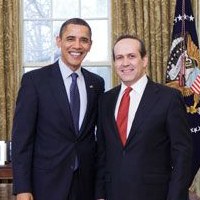
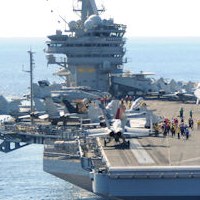
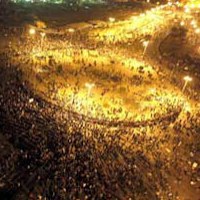

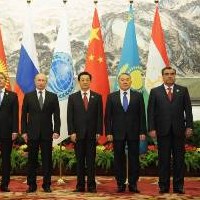




Latest Comments
Hello Mike, Thank you for your positive feedback to the article. I felt there wasn’t too much critical analysis of ...
Thanks for this considered and well constructed article. A follow up article on the manner in which the editorial contro...
THE CLUELESSNESS OF CLAIMING THAT OBAMA'S MIDDLE EAST POLICIES WERE A FAILURE CANNOT BE FURTHER FROM THE TRUTH, WHAT THE...
As long as Obama is the president of the usa do not trust the us government......
Thank you for an good read....